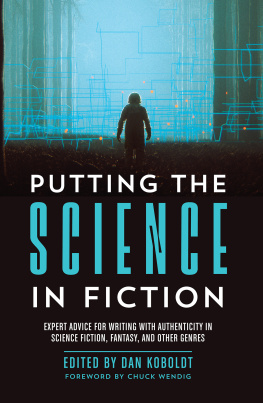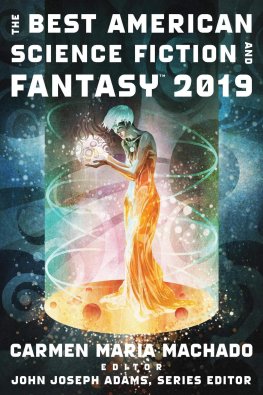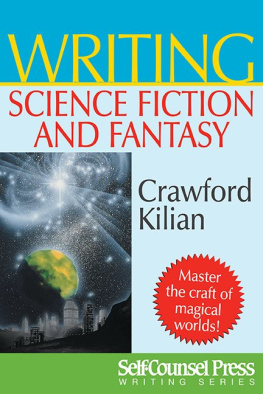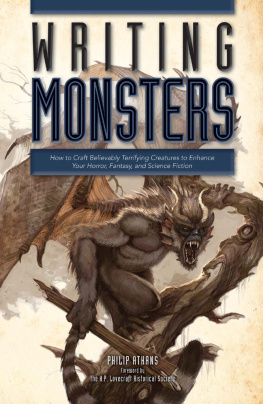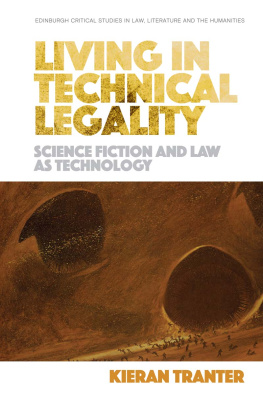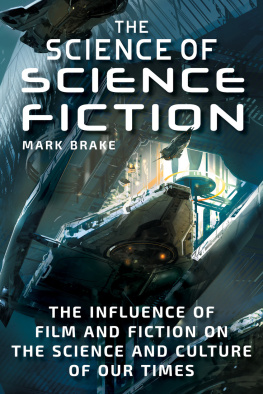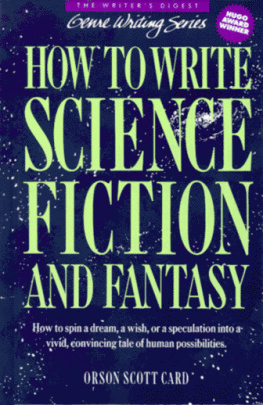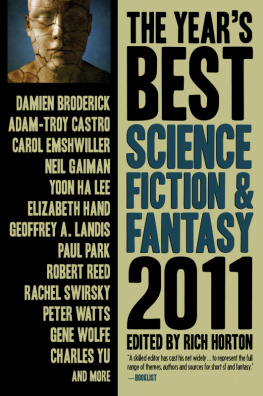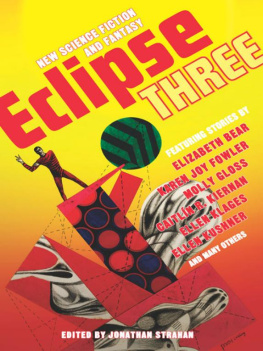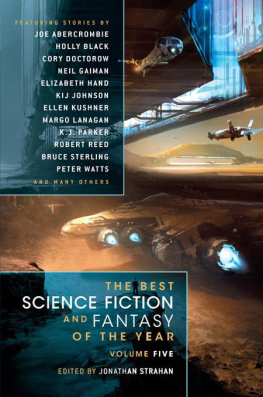PUTTING THE
SCIENCE
IN FICTION
EXPERT ADVICE FOR WRITING WITH AUTHENTICITY IN SCIENCE FICTION, FANTASY, & OTHER GENRES
EDITED BY DAN KOBOLDT
FOREWORD BY CHUCK WENDIG

TABLE OF CONTENTS
DEDICATION
To those who work or teach in S.T.E.M. fields.
FOREWORD
by Chuck Wendig
The piece of advice we writers often hear is this: Write What You Know.
It is good advice. Until its not.
This is true of all of the so-called sacred cows of writing advicefrom Kill Your Darlings to Never Open Your Story With Weather to Dont Use Adverbs Because Adverbs Eat Babies. Theyre a good place to start but not always a great place to finish. They work well as guidelines, but far less as rigorous authorial gospel.
If we give Write What You Know (aka WWYK) too much authoritytoo much weight as a supposed rulewe run the very likely risk of never actually writing anything interesting, because what we know as writers is often quite limited. Many of us write in the genre space, from science fiction to fantasy to horror, and we are automatically walled away from those genres if we interpret WWYK too literally. Ive never ridden a dragon, henceforth, I should never write about riding a dragon. Im not a robot from the future sent to kill the mother of the leader of a future human resistance movement, so how the hell could I write about it? Chased by a masked killer holding a bloodthirsty machete through the woods? Thankfully, no. So I guess I cant write about it? The only thing I can write about is
Being a writer?
Or worse, being a writer who is writing about writing?
Ye gods, what a thrilling novel that would be.
PAGE ONE: THE WRITER WRITES. Scribble, scribble.
PAGE 300: THE WRITER IS ABOUT TO FINISH HIS MASTERPIECE ON THE SUBJECT OF A WRITER WRITING. Its writers writing about writing all the way down.
Ugggh.
However, flip the script a little. If we view WWYK as less of a law and more of an opportunity, what does that afford us?
First, it lets us, when were struggling in the work, to reach to our own lives and find something in there that is as true as we remember it. No, Ive never flown on the back of a dragon, but you know what? Ive stood up out of the open sunroof of a speeding limousine; Ive ridden a Waverunner; Ive stood atop lighthouses and skyscrapers and other tall structures, feeling the wind whipping so hard that it brings tears to my eyes. That gives me something. Something to hold onto. An experience, or sensation, to borrow from when it comes to the work.
Second, it gives me the chance to view the world through the lens of emotional truth, too. Sure, I dont know a lot of very specific things, but I know how a lot of things make me feel. I know what it is to feel exhilarated, or terrified, or what it is to fall in love, or lose someone to disease. I have a lot of emotional truths, and fiction is my chance to speak about those truths no matter what the dragon-robot-monster context I choose to place them in.
Third, and now were really getting to the meat of it, WWYK is not a condemnation or a limitation, but rather an invitation
In particular, its an invitation to know more stuff.
It is an invitation to learn.
And thats what this book is all about.
* * *
Lets switch gears a little bit.
Im kind of a dope. A ding-dong. A wee bit of a goofball. Ive also more or less ruined myself for what some might consider a real career at this point. Ive gone so far down the rabbit hole of writing about hackers and genetically-modified killer ants and space wizards that Ive sullied myself as a proper recipient of gainful employment. If ever the bottom falls out of this whole writing stories thing, I am in the deepest ordure with no rope to pull myself up and out. (Plus, I think the writing career has made me go savage. I imagine two days in a cubicle and Id probably be covered in flies, using fast food wrappers as clothing, cooking a granola bar over a trash can fire. The copier would be my only friend. He would be named Aragorn and we would have adventures and wait, what do you mean Im fired?)
I suppose its never too late to start over, but at this point, could I ever really be a scientist? A chef? A detective? A dragon-tamer? A time-traveling space doctor?
More to the point, do I really want to be those things, when I can, as an author, be all of those things? And more? The authors purview is limitless. Our opportunity to explore everything and anything is only framed by the extent of our imagination.
But imagination really isnt enough.
Lets talk about hackingnot chopping at something with a hatchet, but rather, the art of penetrating computer systems. I dont know how to do that. Ive never done that. Because, spoiler alert, Im not a hacker. Now, when you watch most pop media on the subject of hackers, we get the same thing over and over again: someone has a computer screen open and theres like, a HACKING PROGRESS BAR slowly creeping toward 100%, and meanwhile theres a helicopter outside whose front cannon is whirring bullets, chewing apart the wall as the hacker waits for The Hack to be complete. And then, just as the wall is gone and the helicopter descends, the hacking progress bar dings 100% and
KABOOSH, the helicopter explodes.
The helicopter got hacked, boom.
The hacker, an angsty white guy in his black hoodie, wins again.
Its nonsense, of course. Thats not even remotely how you do it. So, when writing Zer0es, I very distinctly wanted to do the opposite of thatto portray a series of hackers from a variety of backgrounds and cultures with a diverse series of motivations who actually do something on the page that looks, at least at a distance, like actual hacking. (The caveat there being actual hacking is a little boring in terms of writing it in prose, so you have to spice it up a bit.)
I dont know how to hack a computer.
As I said: Im a total ding-dong. Barely fit for public life!
And yet, sysops and hacker-folk said I got a lot of stuff right.
How did I do that?
Well, heres the trick: I talked to experts. And I read books.
Thats it. Thats the secret, and its really no secret at all. And thats the secret non-secret of this book. This book will: a.) Put experts in front of you b.) Let you read about a wide variety of smart, science-flavored subjects.
And it doesnt do so with the singular purpose of teaching you the breadth and depth of a single subjectbe that subject genetics or climate change or space travelbut rather, to teach you how to get started, and how to ask questions, and how to seek out even more information on the topic at hand. To play off the old clich, it doesnt do the fishing for you: It teaches you how to fish.
(Er, again, not literally: This book will not teach you how to fish. Its a metaphor for fishing for information andwell, youre picking up what Im laying down, right?)
So, sure, go ahead, write what you know. But if you dont know enough about the subject at hand? Know more stuff.
And this book is ground zero for doing exactly that.
Chuck Wendig, June 2018
INTRODUCTION
by Dan Koboldt
Science, medicine, and technology have starring roles in a wide range of genres, most notably science fiction, but in other genres as well. Unfortunately, many depictions of technical subjects in literature, film, and television are pure fiction. This is perhaps not very surprising, since most writers dont hold advance technical degrees or have years of laboratory training under their belts. Furthermore, popular myths about scientific and technological concepts have pervaded mass media for decades.

